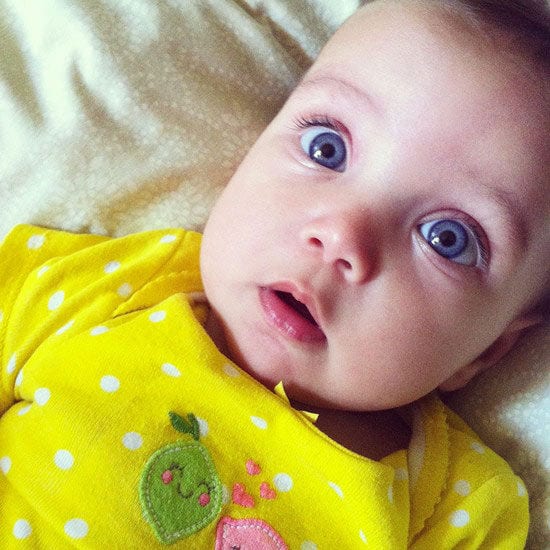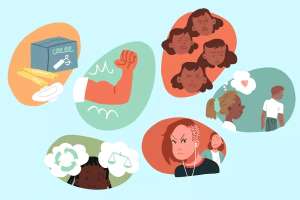There's no certain way to know for sure, but you can guess it yourself – here, we'll show you. Genetic experts How to do it.

Both my husband and I have brown eyes. Does this guarantee we will have a child with black eyes?
No, it's not possible for two parents to have brown eyes and a blue-eyed child. In fact, although less common, the reverse is also possible: two blue-eyed parents can have a brown-eyed child.
“The dominance of brown eyes is a familiar lesson from biology class, but eye color is actually determined by many genes,”
“One gene might say, ‘Let’s make a lot of blue,’ and another might say, ‘Let’s add some brown.’ It’s like layering different colors of chalk,” says Kate Garber, Ph.D., director of education in the Department of Human Genetics at Emory University School of Medicine. “Meanwhile, other genes control the amount of pigment. So, more blue pigment might outweigh brown,
Or a difference may arise such as hazelnut.
Robin Bennett, a genetic counselor at the University of Washington Genetic Medicine Clinic in Seattle, says it's not that genes are dominant and recessive, but that they have stronger, lesser effects. "Traditionally, we thought that dominant genes made the product and recessive genes didn't. Now we know that both sometimes happen."
My husband's blonde hair is gradually fading to a vibrant red. Will our baby inherit the more attractive color?
There are no guarantees, of course, but it might happen. If not, your signature color will stand out alone in the family (although you may end up with a blonde color).
“True red hair has to be in two copies of the expressed gene,” says Lita Tribble, director of education at the Greenwood Genetics Center in South Carolina. In fact, only 1 to 2 percent of people have fiery red hair, along with fair skin, freckles, and pale eyes—the classic color combo is part of that genetic package.
The gene can be carried latently through generations, then the parents are surprised by the blonde color orDark hair.
Meanwhile, your children's hair could be very different. "Genes are being modified with each child," says Garber. That's why it's difficult to answer the classic question, "What will my child look like?"
Physical properties
هناك boils In other children. Is it possible for my child to have it?
Yes, if your partner carries it, or if it runs in one of your or his families. “Dimples are considered dominant, and because they are seen as a dominant trait, only one parent has to have the trait to pass on the gene,” says Tribbles. Similarly, your child stands to inherit dimples, a rolled tongue, and even earlobes. “These are more predictable traits that definitely run in families,” says Bennett.
Of course, you can't choose what comes in the genetic package. "Sometimes when we evaluate children with simple abnormalities—say, funny-shaped ears or oddly shaped toes—it turns out to be simply something that's passed down through the family," says Barbara Burton, MD, clinical practice manager in the Department of Genetics.
Length
If one parent is tall and the other is short, will a child be of average height? Will they produce children somewhere in the middle?
In general, yes. The basic rule of thumb is to take the average height of the parents, then add 5 cm for the boy and subtract 5 cm for the girl. It's not uncommon for two children to be tall and two to be short. But rules are made to be broken. Height is a polygenic trait—there's no single gene that works alone—and environmental factors such as Malnutrition It can prevent a child from reaching their potential height. “You'll see babies out of formula in both directions.
Wight:
I've struggled with my weight my entire life, and so has my partner. Are we dooming our children to be obese and suffer all the health problems that come with it?
In fact, some families are more likely to pack on the pounds. “We’ve long known that heavier parents have heavier children, and now we know that at least one gene causes weight gain,” says Garber. “It seems that a child who inherits this from both parents is more likely to be obese.” Of course, this hardly causes obesity—it’s just the known genetic factor that almost certainly exists among others that have yet to be identified, says Garber.
Special abilities
It seems to me that people smart people They have smart, athletic children who raise athletes. Do these children really have a natural memory?
Thomas Spencer, a psychology professor at San Francisco State University, agrees that "smart kids come out of smart homes," and says studies suggest a genetic influence. But parents don't just encourage high IQs; they also encourage a love of learning.
“Reading and talking, including sitting down together at dinner for a family conversation, helps children,” says Spencer. Develop a positive attitude towards books and learning.” “This is something that can Any parent can offer it.“You don't need money and a lot of formal education.”
musical talent
Similarly, musical talent appears to be genetic, but researchers say it needs to be nurtured early in training, ideally before age 7. Making the necessary connections in the brain early in life allows the natural ability to flourish rather than languish. Of course, music lessons aren't a lost cause for a child of deaf parents—but they're unlikely to become a prodigy. "You can teach anyone to play the piano, but that child will never match the level of the person in the family whose musical ability is being practiced," says Spencer.
athletic ability
The same “use it or lose it” message applies to athletic ability, another inherited trait: A natural athlete won’t become strong by idling around. “A kid who doesn’t look athletic but works hard might do better,” says Allan Guttmacher, deputy director of the National Human Genome Research Institute.
Again, there is no specific gene for sports; rather, individual factors predispose a child to it.










